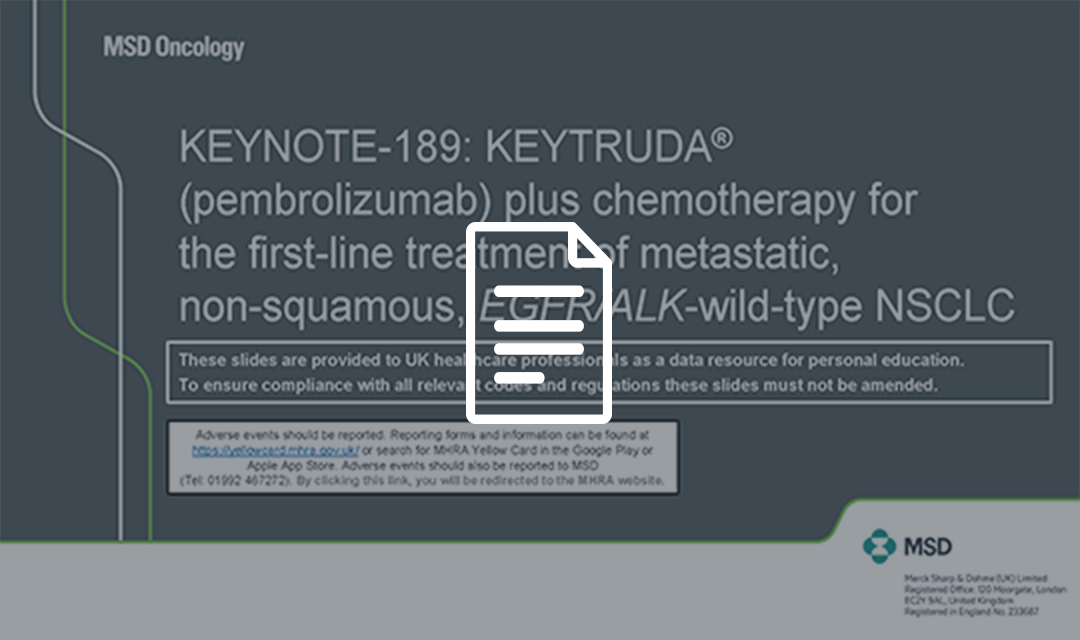KEYNOTE-024: KEYTRUDA monotherapy in mNSCLC
Prescribing Information (Great Britain) & Prescribing Information (Northern Ireland) [External links]
Discover the 5 year survival results from KN024*
KEYNOTE-024 study design1
KEYNOTE-024 is an international, randomised, open-label Phase III trial with 305 eligible patients.
Out of the total eligible population (n=305), first-line adult patients with mNSCLC, a PD-L1 TPS of ≥50% and no EGFR or ALK positive tumour mutations were randomly assigned in a 1:1 ratio to pembrolizumab 200 mg every 3 weeks (Q3W) (n=154) or platinum doublet chemotherapy (n=151) for 4 to 6 cycles.1
Progression-free survival was the primary endpoint. Secondary endpoints consisted of overall survival, overall response rate, and safety.1
The results of this Phase III trial were first published with a median follow-up of 10.4 months.1
The latest follow-up was published with a median follow-up of 59.9 months.2
The original analysis1
KEYTRUDA monotherapy demonstrated a superior PFS and OS benefit vs. platinum-based chemotherapy as first-line therapy for metastatic NSCLC with PD-L1 TPS ≥50%:1
- Superior PFS with a 50% reduced risk of progression or death (HR 0.50, p<0.001)1
- Superior OS with a 40% reduced risk of death (HR 0.60, p=0.005)1
- Superior ORR (44.8% vs. 27.8%, p=0.0011) and improved DOR1
- KEYTRUDA monotherapy had fewer grade 3–5 treatment-related AEs, but a higher frequency of grade 3–5 immune-mediated AEs and infusion reactions, vs. chemotherapy1
*Exploratory endpoints – no statistical conclusions can be drawn from them.
At a median follow-up 59.9 months, KEYTRUDA monotherapy continued to provide survival benefit in the 5-year exploratory analysis of KEYNOTE-024.2
With KEYTRUDA, almost a third of patients
(31.9%)
were still alive after 5 years2
(HR 0.60, p not tested)
5-year OS rate numerically doubled with KEYTRUDA:
31.9%
vs.
16.3%
with chemotherapy
(with a 66% effective crossover rate)†2
(p not tested)
Median OS of
26.3 months
vs.
13.4 months
with chemotherapy2
(HR 0.52, p not tested)
Trend towards ORR benefit was maintained
46.1%
with KEYTRUDA
vs.
31.1%
with chemotherapy2
(p not tested)
†Maximum duration of treatment of 2 years; a second course of treatment was administered in a small number of patients (12/154)
A generally manageable tolerability profile. KEYTRUDA monotherapy had fewer all-grade treatment-related AEs, but a higher frequency of Grade 3–5 immune-mediated AEs and infusion reactions, vs. chemotherapy.1,2
The recommended dose of KEYTRUDA as monotherapy is either 200 mg every 3 weeks or 400 mg every 6 weeks, administered as an intravenous infusion over 30 minutes.3
Explore our related resources
Explore our related resources
Pembrolizumab is recommended as an option for untreated PD-L1-positive metastatic non-small-cell lung cancer (NSCLC) in adults whose tumours express PD-L1 (with at least a 50% tumour proportion score) and have no epidermal growth factor receptor- or anaplastic lymphoma kinase-positive mutations, only if pembrolizumab is stopped at 2 years of uninterrupted treatment or earlier in the event of disease progression and the company provides pembrolizumab according to the commercial access agreement.4
Pembrolizumab is recommended as an option for treating locally advanced or metastatic PD-L1-positive non-small-cell lung cancer in adults who have had at least one chemotherapy (and targeted treatment if they have an epidermal growth factor receptor [EGFR]- or anaplastic lymphoma kinase [ALK]-positive tumour), only if pembrolizumab is stopped at 2 years of uninterrupted treatment and no documented disease progression, and the company provides pembrolizumab in line with the commercial access agreement with NHS England.5
Pembrolizumab is recommended as an option for untreated PD-L1-positive metastatic non-small-cell lung cancer (NSCLC) in adults whose tumours express PD-L1 (with at least a 50% tumour proportion score) and have no epidermal growth factor receptor- or anaplastic lymphoma kinase-positive mutations, only if pembrolizumab is stopped at 2 years of uninterrupted treatment or earlier in the event of disease progression and the company provides pembrolizumab according to the commercial access agreement.4
Pembrolizumab is accepted for restricted use within NHS Scotland as monotherapy for the first‑line treatment of metastatic non-small cell lung carcinoma (NSCLC) in adults whose tumours express programmed death ligand 1 (PD-L1) with a ≥50% tumour proportion score (TPS) with no epidermal growth factor receptor (EGFR) or anaplastic lymphoma kinase (ALK) positive tumour mutations.6
Pembrolizumab is accepted for restricted use within NHS Scotland for the treatment of locally advanced or metastatic non-small cell lung carcinoma (NSCLC) in adults whose tumours express programmed death ligand 1 (PD-L1) and who have received at least one prior chemotherapy regimen.7
KEYTRUDA as monotherapy is indicated for the first-line treatment of metastatic non-small cell lung carcinoma (NSCLC) in adults whose tumours express PD-L1 with a ≥50% tumour proportion score (TPS) with no EGFR or ALK positive tumour mutations.3
KEYTRUDA as monotherapy is indicated for the treatment of locally advanced or metastatic NSCLC in adults whose tumours express PD-L1 with a ≥1% TPS and who have received at least one prior chemotherapy regimen. Patients with EGFR or ALK positive tumour mutations should also have received targeted therapy before receiving KEYTRUDA.3
The recommended dose of KEYTRUDA as monotherapy is either 200 mg every 3 weeks or 400 mg every 6 weeks, administered as an intravenous infusion over 30 minutes.3
Find out more about KEYTRUDA in mNSCLC
Chemotherapy in non-squamous mNSCLC
Chemotherapy in squamous mNSCLC
Patient Management
Sign up to MSD emails
✔ Get the latest product updates
✔ Receive cancer resources
✔ Be the first to hear about our events
References
- Reck M et al. N Engl J Med. 2016;375:1823–1833.
- Reck M, et al. J Clin Oncol 2021. doi: 10.1200/JCO.21.00174. Online ahead of print.
- KEYTRUDA Summary of Product Characteristics.
- National Institute for Health and Care Excellence (2018). TA531: Pembrolizumab for untreated PD-L1-positive metastatic non-small-cell lung cancer. Manchester: NICE. Available from: https://www.nice.org.uk/guidance/ta531. NICE guidance is prepared for the National Health Service in England, and is subject to regular review and may be updated or withdrawn. NICE has not checked the use of its content in this document to confirm that it accurately reflects the NICE publication from which it is taken.
- National Institute for Health and Care Excellence (2017). TA428: Pembrolizumab for treating PD-L1 positive non-small-cell lung cancer after chemotherapy. Manchester: NICE. Available from: https://www.nice.org.uk/guidance/TA428. NICE guidance is prepared for the National Health Service in England, and is subject to regular review and may be updated or withdrawn. NICE has not checked the use of its content in this document to confirm that it accurately reflects the NICE publication from which it is taken.
- Scottish Medicines Consortium (2017). Pembrolizumab for untreated PD-L1 positive metastatic non-small-cell lung cancer. Available from: https://www.scottishmedicines.org.uk/medicines-advice/pembrolizumab-keytruda-fullsubmission-123917/.
- Scottish Medicines Consortium (2017). Appraisal determination: Pembrolizumab 50mg powder for concentrate for solution for infusion (KEYTRUDA®). Available from: https://www.scottishmedicines.org.uk/medicines-advice/pembrolizumab-keytruda-fullsubmission-120417/.
Supporting documentation
Prescribing Information (Great Britain) & Prescribing Information (Northern Ireland)
By clicking the links above you will leave the MSD Connect website and be taken to the emc PI portal website


